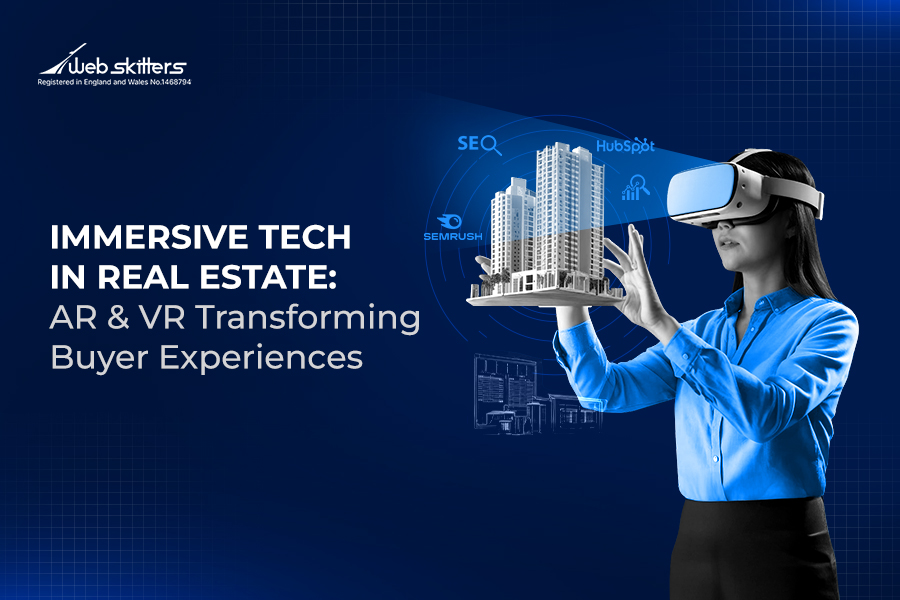Innovate UK, a government initiative, is investing £3.6 million in businesses that develop therapeutic XR (Extended Reality) solutions to provide mental healthcare services. This project represents another targeted investment aimed at promoting an immersive tech ecosystem.
What is immersive tech?
These are the technologies that provide an immersive experience to the users through concepts like AR (Augmented Reality), VR (Virtual Reality), and MR (Mixed Reality). These are often a subset of what is called XR (Extended Reality).
Although this investment is focused on digital therapeutics, immersive tech goes deeper than that.
Immersive tech tools like AR, VR, and MR are transforming real estate , education, automobile, and other sectors. With next-gen solutions like DigiAR, Digitour, and AI-powered floor plans, immersive tech is making experiences more interactive, cost-effective, and accessible.
Before diving deep into the real estate, let’s trace back to the time when the UK government first recognised immersive tech to be a big thing!
How the UK Government is Endorsing Immersive Tech?
“Developing the skills and infrastructure underpinning immersive technology will maximise the potential of our powerful creative industries and achieve our goal of growing them by £50 billion by 2030.”— Lucy Frazer, Former Culture Secretary of the UK.
These were her words back in 2024 when the new plan was announced.
What was the £3.6 million funding about?
The UKRI (UK Research and Innovation) announced in January 2024 that it would grant £3.6 million in funding to support artists and organisations in the UK to explore the creative potential of immersive technology.
This fund will be available to 200+ artists and organisations that use immersive tech, including AR & VR (Augmented Reality and Virtual Reality) as well as MR (Mixed Reality).
This technology has evolved a lot since the announcement of the £3.6 million funding programme.
In 2025, a Cambridge researcher, Dr. Chris Macdonald, developed a groundbreaking platform that is based on AI and VR (Virtual Reality). The platform is educational in nature and provides a tailored course based on photorealistic VR. This virtual yet realistic training environment also takes support from an AI coach.
But what does this platform do?
This VR platform helps students and professionals overcome the fear of public speaking and social anxiety. While face-to-face presentation is one of the most vital parts of career progression and education, 80% of students say that public speaking is the most feared activity.
This is how immersive tech is transforming experiences throughout the UK. However, it is not restricted to ed-tech.
Other industries, such as real estate, e-commerce, and automobile, are also leveraging this technology to provide a superior experience for their customers or users.
What does Immersive Tech have to do with Real Estate?
When we talk about the role and potential of immersive tech in real estate, we can’t ignore the innovative approach of Housing.com. This company is one of the top players in the Indian real estate game.
Housing.com revolutionised the home-buying experience 10+ years ago with immersive tech. However, in 2025, this company is setting an example of how to leverage AR & VR in real estate with its next-gen innovations.
They are providing buyers with even more automated and immersive proptech experiences.
Let’s talk about these proptech tools a bit.
1. DigiAR
This is an AR solution that allows buyers to view property prototypes and designs in 3D. It gives a complete overview of the property as envisioned by the developers.
WebAR and DigiAR collectively provide users with visuals of the property through digital replicas of real plots. This immersive tech brings a realistic and interactive aspect to the search experience.
2. Digitour
Digitour is a VR technology that provides immersive property walk-throughs using PT (Pose Tracking) and 3D displays. This allows customers to examine the properties in detail without being physically present.
This immersive tech solution benefits remote buyers who want to evaluate a property before making a decision.
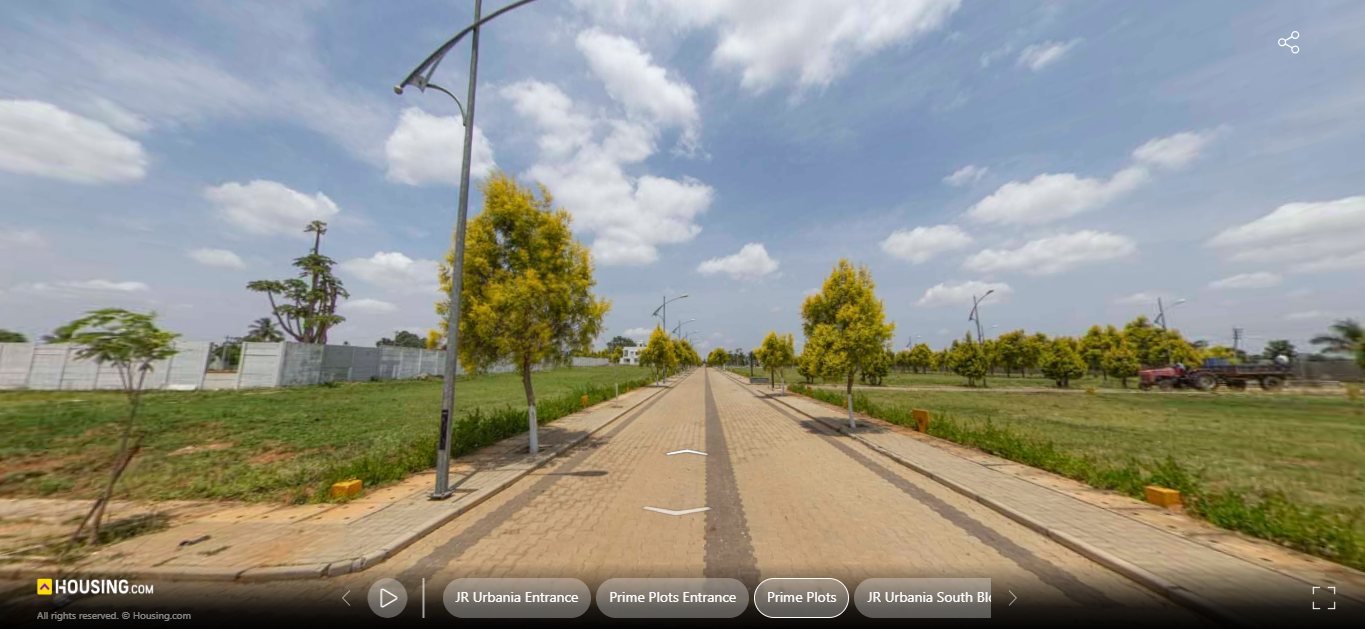
(Source: Housing.com)
3. DigiPlot
As the name suggests, this 3D tool gives a comprehensive 3D view of plots. The tool also gives an idea of the availability of plots and how near it is to key landmarks.
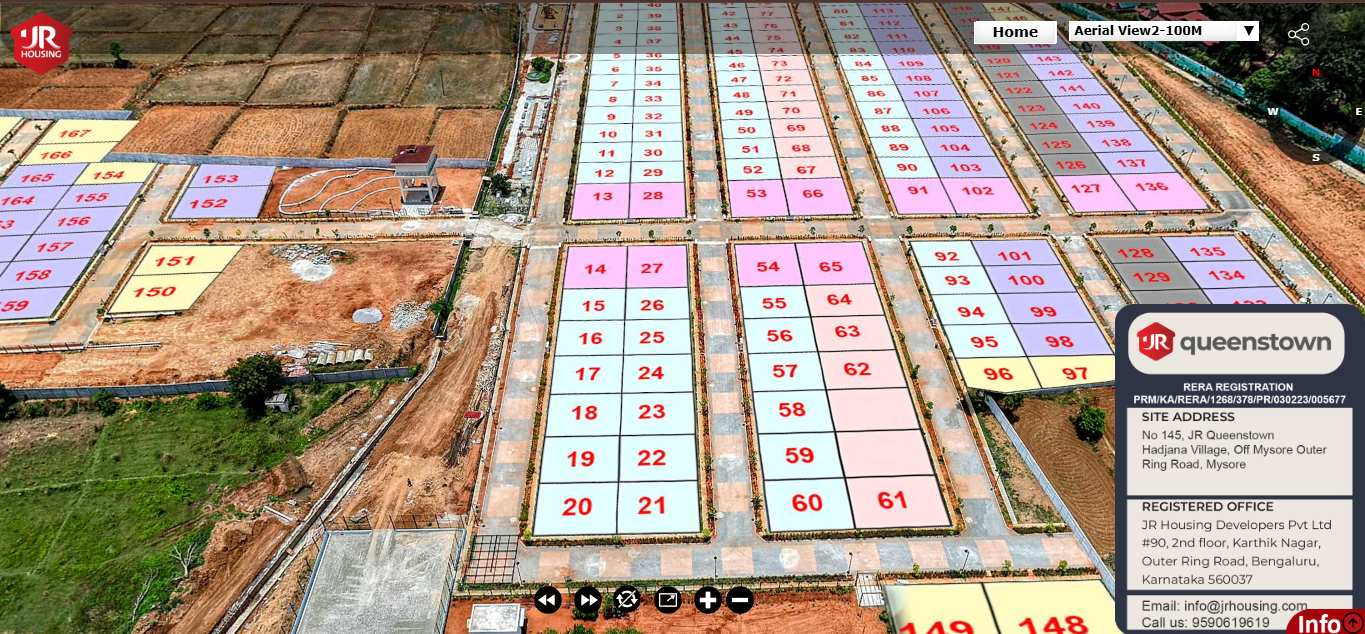
(Source: Housing.com)
4. DigiSlate
This proptech tool helps both the real estate agents and buyers. DigiSlate allows estate agents to access real-time project insights. This fosters trust between the agent and the customer by allowing the agent to present relevant and updated visuals and key details during the meetings.
5. DigiPort and Droneview
These take the visualisation of the real estate properties to the next level. DigiPort and Droneview allow the customers to have an aerial perspective. This, in turn, provides a comprehensive idea about the connectivity and layout.
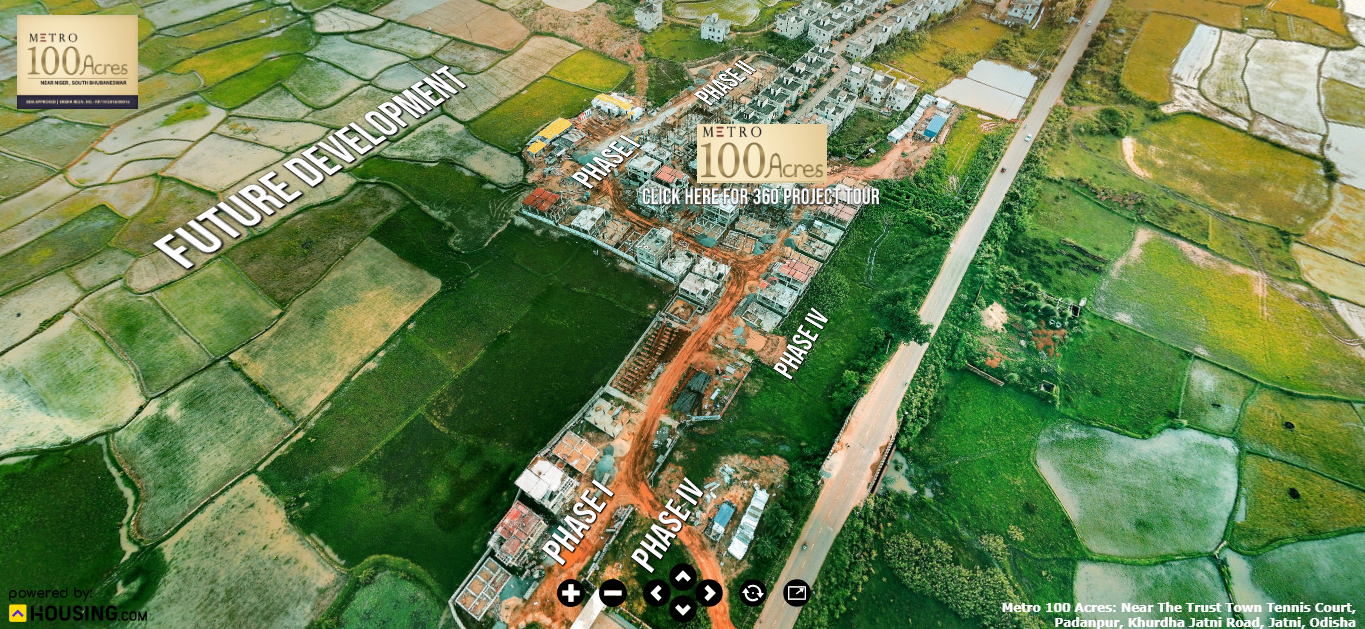
(Source: Housing.com)
6. Floorplan 3D
This tool is powered by Gen AI like ChatGPT and transforms 2D floor plans into 3D interactive models. So, Floorplan 3D allows the buyers to experience their future house in detail. This way, the buyers can make informed buying decisions.
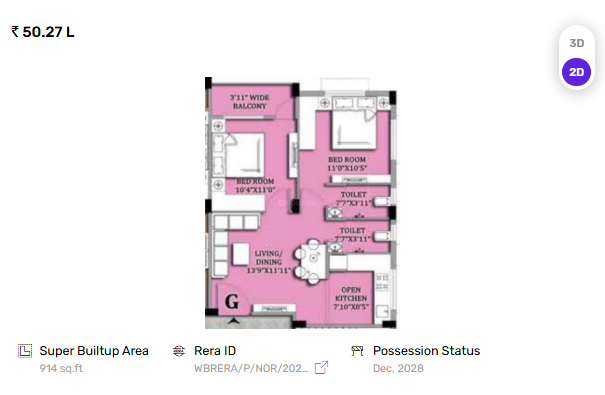
(Source: Housing.com)
This is the 2D plan of a property.
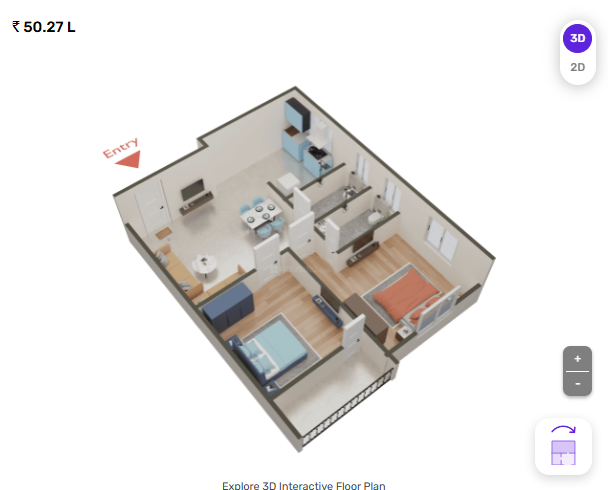
(Source: Housing.com)
This is the 3D model of the same 2D blueprint.
These next-gen immersive tech in real estate aim to enhance the consumer experience with an immersive journey. The technology not only improves understanding of properties for sale but also brings the surroundings to life. This leads to better decision-making and a reduction in costs and time.
With the use of advanced algorithms, the proptech reduces human intervention and lowers costs. To such an extent that it lowers costs by around 70% and reduces the turnaround time for creating floor plans.
“These visualization initiatives are about creating meaningful experiences and adding value for our users. By providing immersive, interactive tools, we’re allowing consumers to experience properties in a way that feels almost tangible, bridging the gap between virtual exploration and real-life decision-making. At Housing.com, we are committed to harnessing machine learning (ML) and artificial intelligence (AI) to enhance both our operations and the user experience. By constantly exploring innovative implementations of these technologies, we are not only improving efficiency but also gaining a competitive advantage in the market.” — Sangeet Aggarwal, Head of Product at Housing.com.
Although immersive tech has huge potential and can be utilized for more in the real estate sector, tools like AR & VR are currently shaping this industry into something that’s nothing short of exceptional.
How Immersive Tech can help the Real Estate Industry?
The real estate industry is known for volatility and value. And, it has come a long way when it comes to technology.
With AR, VR, and MR, developers and realtors can easily speed up the sales process and enhance the lead’s spatial and navigational experience.
In the AR & VR domains of real estate, each of these immersive technologies has different levels of immersion and safety.
Let’s explore their uses in this industry.
Augmented Reality or AR in Real Estate
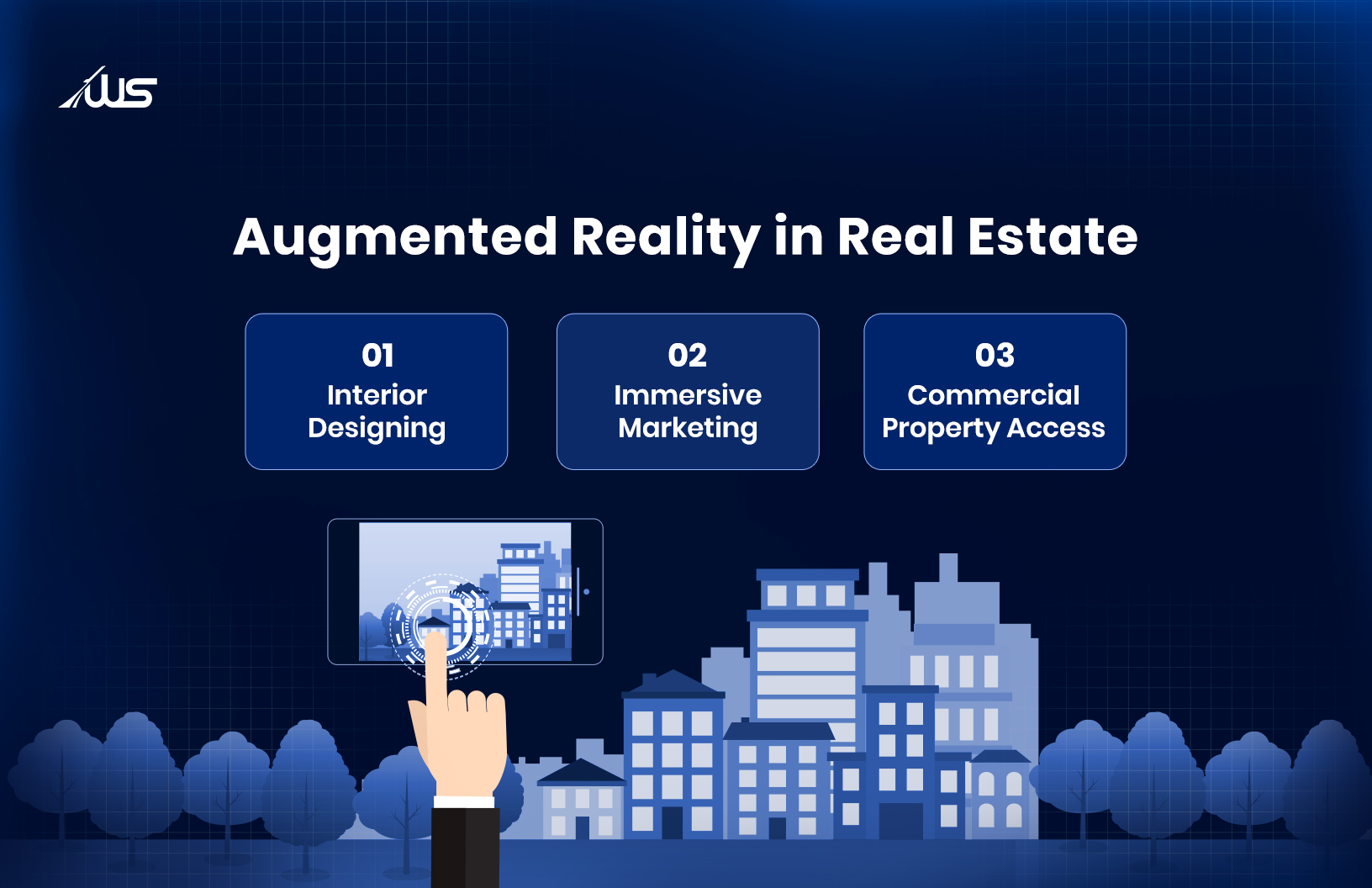
1. Interior Designing
Who doesn’t want to design their house with their favourite things? That’s what makes a house home. AR helps in that. The users can visualise the placement of furniture and other home décor with Augmented Reality. Even before selecting the interior décor, consumers can try designs and styles in a virtual environment. This improves user satisfaction.
2. Immersive Marketing by AR
A user can better decide if he/she want to purchase a property with proper information. So, critical information about the project, like square feet and price, can be important for users. If a business can market the property information through realistic AR-based apps, the users will be highly impressed. This can lead to successful property sales.
3. Accessing Commercial Property through AR
If you have an AR-based app for your real estate business, users can reach out to you easily. They can scan the properties remotely and access information. This information may include amenities, tenancy, and space within the properties. This way, they can make a decision and can reach out only when they are interested in the commercial space, reducing much time and effort.
Virtual Reality or VR in Real Estate
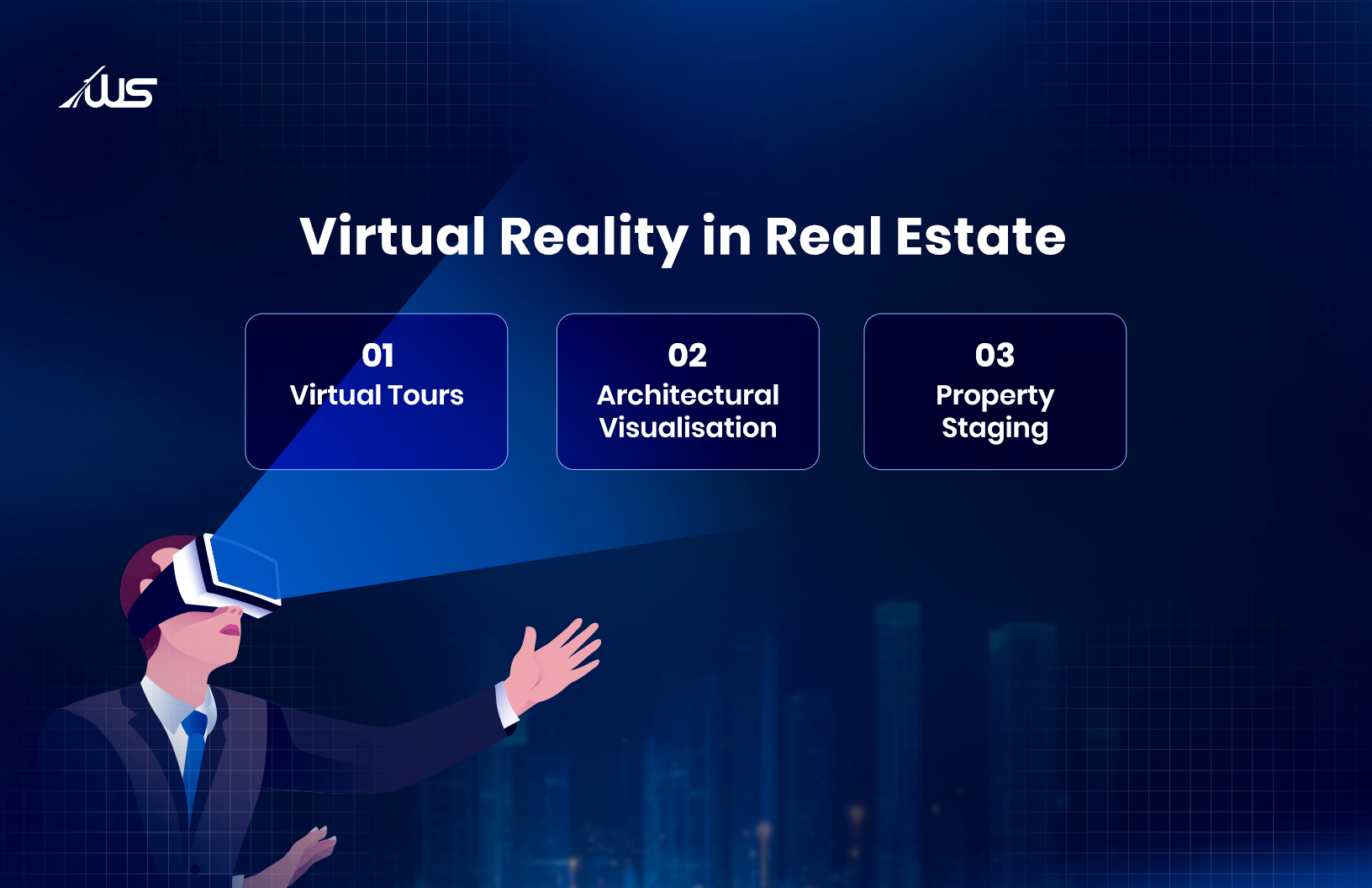
1. Property Tours with VR
Your prospects will love it if you provide them with a realistic experience. So, allowing a virtual tour of the property before they buy it can work wonders for you. You can utilise VR headsets to give them a walk-through of the apartment. This will give them an exceptional experience through HD virtual environments. The following can only be achieved by immersive tech.
2. Architectural Visualisation
You have to empower your leads to envision the property, which is still in design or architectural phases. This will make them highly interested in the property if they like what they see. So, use VR-based apps to give them an experience of a lifetime by transforming 2D structures into VR prototypes.
3. Property Staging by VR
Staging the property with home décor and furniture can go a long way for your sales. If you display enhanced properties through Virtual Reality (VR), the prospects can decide faster. This can reduce the selling time and business costs.
The Future and Challenges of Using AR & VR
The potential of immersive tech in real estate is indeed unimaginably vast. But there are still some challenges that need to be addressed.
What are the challenges of using immersive tech in real estate?
- High cost of VR goggles and headsets
- Lack of robust infrastructure for immersive tech like AR & VR
- Lack of awareness among users about immersive tech
- Increased costs for businesses
- If immersive tech isn’t used skilfully, ROI can be affected
However, there is a bright future for immersive tech in the real estate industry. Let’s discuss them briefly.
- Accessibility: There is a high chance that, with time, the cost of AR & VR devices will decrease. As the price falls, the immersive tech tools will start becoming more accessible to a wider range of sellers and buyers.
- Integration with AI: We are already seeing the integration of immersive tech with Gen AI like ChatGPT. However, we will see more of these integrations in the future. The combination of AR & VR and AI (Artificial Intelligence) will make the experience more dynamic and personalised. One such concept is predictive property design recommendations in line with the user preferences.
Immersive Tech is the Need of the Hour: Is your Business Keeping Up?
Looking ahead, it is quite straightforward to see that AR & VR will revolutionise the real estate industry even more.
The future is quite exciting for immersive tech, especially for real estate businesses. It allows customers to interact and explore properties in a way that was once thought impossible.
The next generation innovations in immersive tech, as seen in the case of Housing.com, give us a glimpse of its potential (if used correctly).
Even the UK government had identified this potential back in 2024. That resulted in the grant funding of £3.6 billion.
That’s how important it is for businesses to leverage immersive tech for improved business outcomes.
Do you want to integrate immersive tech into your business? We have a plan for you.
Contact Webskitters Ltd. and let’s make something groundbreaking together!
FAQs
What is the UK government doing to promote immersive technology?
They are funding research, skills, and infrastructure to grow creative industries using immersive tech.
How is the real estate industry using immersive tech?
Real estate companies use AR and VR tools like DigiAR and Digitour for 3D property views and virtual tours.
What are the main benefits of immersive tech in real estate?
It enhances customer experience, speeds up sales, reduces costs, and improves decision-making.
Can immersive tech help buyers design their future homes?
Yes, AR lets buyers visualise furniture, décor, and layouts in real time before purchase.
What challenges does immersive tech face in real estate?
High device costs, lack of awareness, and infrastructure gaps slow its widespread adoption.

